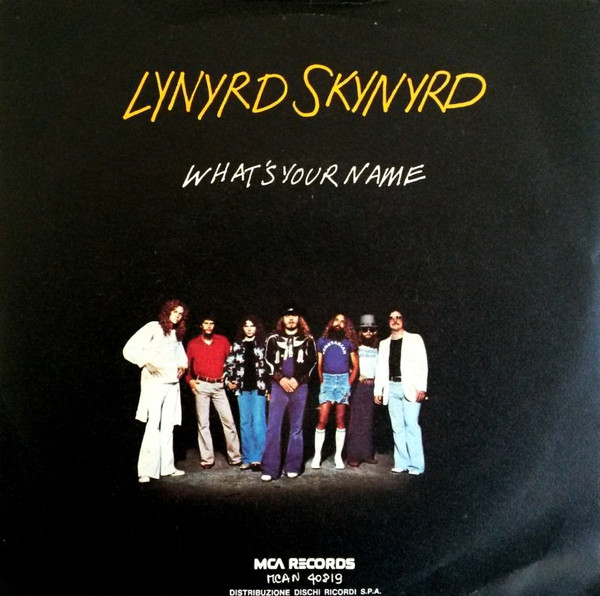Lynyrd Skynyrd: What’s Your Name?
[purchase]
Growing up in the 1970s, as I did, the life of a rock musician seemed pretty fucking cool. Especially the famous ones, who got to jet around the world, perform in arenas and stadiums, have all sorts of fun contract riders to attend to their every anticipated needs, and apparently make tons of money. (Although in reality, for most touring musicians, it wasn’t this great) It seemed like the essence of freedom (although it probably became a bit of a regimented slog at some point, or there wouldn’t be so many life on the road is a bummer songs.) Plus there were the drugs, which I knew could be deadly or at least damaging, but seemed like they could be fun in moderation. And the groupies. I’m betting that a large number of people who became rock musicians did so in some large part for the promise of sex, with a different conquest in every town. A concept which was different in the pre-AIDS era.
Which brings us to our featured song, 1977’s “What’s Your Name?” by Southern rock masters Lynyrd Skynyrd. I wrote a long piece about the band HERE, so if you want some background on them, including the whole Neil Young “controversy,” check it out, and we’ll still be here when you are done.
The song, from the band’s final album recorded before the plane crash album (but released just after), Street Survivors, is based on a true incident (which did not actually take place in Boise, Idaho, however), when the band was thrown out of a hotel bar while on tour because, as the song says, “one of the crew had a go with one of the guests.” Repairing to their rooms, the narrator asks a woman (ok, a “little girl”) to join him upstairs for a “drink of champagne.” He’s not looking for a deep, meaningful relationship, but rather, as stated in the opening, he’s looking for “a little queen,” and he intends to “treat her right.” Which I think we can all agree, means sex. And, he’s not bullshitting her, either—he’s “shooting you straight,” about his intention.
Fast forward to nine a.m the next morning, and our champagne quaffing musician is up suitably early to prepare for a 600 mile ride to the next show. Apparently, the night went well-as he says, “it sure was grand,” and offers to get his bedmate a taxi home. And he suggests that they get together when the band swings through town the next year. There’s only one real problem—he doesn’t remember (or never knew) her name, so he asks for this critical piece of information.
“What’s Your Name?” is a fun rocker, and reached No. 13 on the Billboard Hot 100, posthumously.
Now, bear with me for a second. At the risk of blowing any feminist cred that I’ve achieved, I’d argue that by 1977’s standards, “What’s Your Name?” is fairly progressive, despite its hint of underage sex and anonymous coupling. As far as the underage part goes, I’m willing to consider that “little girl” is a term of endearment, not a literal description. And yes, it’s a bit sexist, but again—1977, and rock musicians. Secondly, I’d argue that the song depicts a fully consensual relationship—there’s no evidence that the woman was already incapacitated when the singer offers her champagne in his room, and he’s clearly “shooting her straight.” Third, the next morning, he’s complimentary and polite, offers to call a cab, and seems to sincerely want to see her again the next year.
Look, I can also see how this could be interpreted differently (I found one source referring to the song as “perpetuating misogynistic fantasies”)—I’m not an idiot, and I have a wife and daughter (and mother-in-law) who graduated from women’s’ colleges —and by 2022 standards, there are certainly some issues here. But if you actually read some of the stuff linked to in the Cover Me piece about how (at least the pre-crash version of) Lynyrd Skynrd’s politics have been misinterpreted, again through the lens of the 1970s, I’d argue that simply tarring them as a bunch of sexists as a result of “What’s Your Name?” is at least a little bit unfair. I mean, they very well might have been a bunch of sexists, but not just because of the song.






























































































































































































































































































































































































